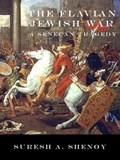For the last two thousand years, the Jewish nation, true and loyal to its ancient heritage, has condemned Flavius Josephus as a traitor to the Jews and a lackey of the Flavian Romans. My research into the Jewish War by Josephus shows that the longheld perception as a traitor is quite mistaken.
Josephus used 'genres disjunction' in his War narrative to convey a hidden perception opposed by the public perception. The public perception is of the foreground text of the Jewish War, in which the Flavian Romans are praised as the heroes and the Jews as the villains. The hidden perception is in the background text of the Jewish War which is a five-Act tragedy modelled on Seneca's tragedies. In the background text we find that the Flavian Romans are the villains and the Jewish nation are trasformed into the hero-victims of a classical tragedy.
The 'genres disjunction' of multiple texts in a single work is not unique to Josephus. It served him well to hide his attitudional disjunction towards the Flavians from whom he benefitted. Unfortuntely, it also hid his love for the Jewish nation. My study is the first attempt to prove Josephus was a loyal Jew but an inveterate secret enemy of the Flavian Romans.

